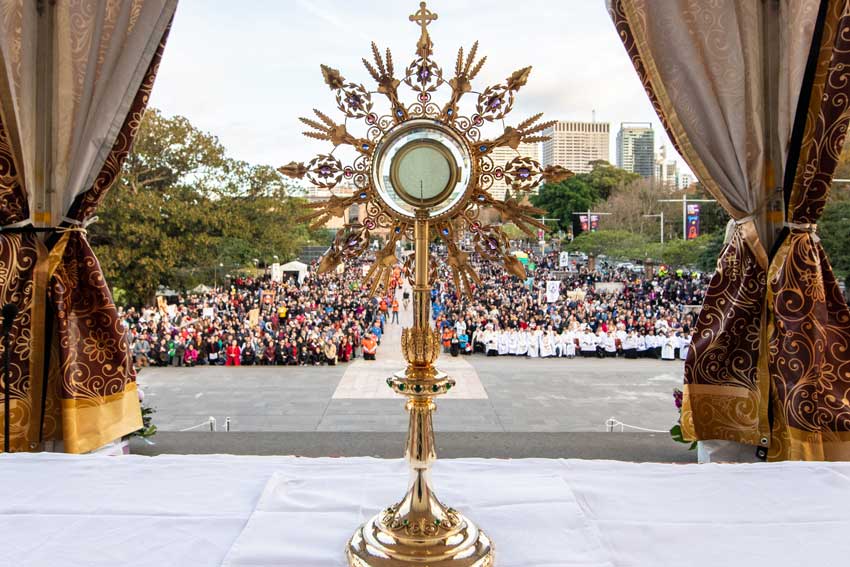
By Steven Buhagiar
As we grow older, we often look back with fondness on the time we shared with our families as young children. In the main, we were happy to be with our parents and siblings especially when it involved a trip out of the ordinary or where we dressed up and prepared ourselves for a special occasion.
As parents, it’s a key part of our role to create memories with our children that benefit their personal growth and development and which can form a sure basis in their headlong run towards adulthood and its inherent responsibility.
A Eucharistic procession, such as the Walk with Christ, has the immeasurable potential to create a memory that will stay with our children for a lifetime.
In an age where belief in the Real Presence of Jesus Christ in the Eucharist is waning even among Catholics and where few can articulate with clarity what this belief is, it is increasingly important that parents take up every opportunity to teach their children this fundamental truth not only in theory but in actual practice as well.
Following are 10 reasons why parents do well to attend a Eucharistic procession with their children especially when they are in their younger years and so very open to the newness and excitement of this unique experience.
1. Our children share our belief in the Eucharist
It Jesus Himself who is present in the Eucharist – His whole Person, Body, Blood, Soul and Divinity! The Eucharist is at the very centre of our Catholic Faith and in the words of the Catechism, is its “source and summit”. Unfortunately, this does not always seem to be the case with this fact clearly evidenced in the report What Americans know about religion released in July 2019.
The report noted that 50 percent of US Catholics did not know that the Eucharist is the actual Body and Blood of Jesus Christ. Sadly, we can assume that this situation would be very similar in our own country as well.
As parents, and as a parish community, we need to make sure that every single Catholic child knows concretely the inestimable gift that we have in Our Blessed Lord present in the Eucharist! To teach a child why and to whom we pray and genuflect is one of the key teaching moments of a young child’s life.
The Church has always taught that the duty of education resides in the first instance with a child’s parents. However, every single one of us – parent, teacher, catechist, and clergy alike – should do everything in our means to make this belief explicit and embedded in a child’s consciousness by way of our careful teaching and our lived example.
At a Eucharistic procession, especially when Christ passes by, we have such a rich opportunity to bow, kneel and recite an act of love with our children which we hope will pierce their hearts and stay with them forever.
2. We prioritise our time to walk with Jesus because it’s important
Our children learn to recognise what we hold dear in our lives very quickly. We teach them through our example and often they take on-board our values without much need for it to be spoken explicitly. They sense by way of the care with which we handle something or attach a sense of pride to it, that it is valued and set apart.
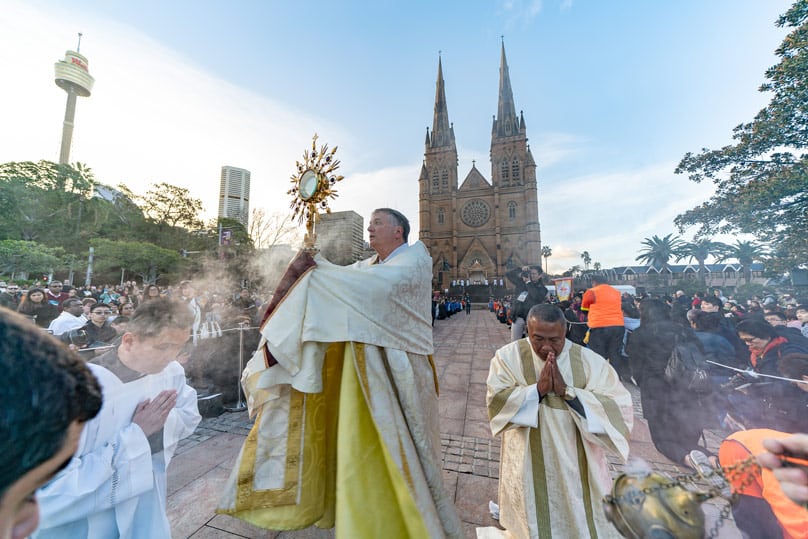
The same is true with our spiritual formation. Children learn that as a family, for example, we will say our prayers before we go to bed… every night! It is a habit that is recognised and which becomes part of what we do as a family. We go to Mass on Sunday, we wear a scapular, or we say a decade of the rosary when someone is sick.
Attending a Eucharistic procession and knowing that it is important to do so in this day and age, is what parents are saying to their children, without words, when they make time in their busy schedule to catch a train to the city on a certain Sunday afternoon in November. To be in attendance at a Eucharistic procession is something in our lives that has priority!
3. As a family, we give public witness to our belief in Jesus
In reading the history of the Church, we find in almost every century, individuals and communities who where called to give witness to their belief in Jesus Christ even to the point of giving up their lives. We also know this to be true in this very day. Just last week a priest and his own father were gunned down as they entered a parish church in Syria by members of ISIS.
Giving witness to the Faith is a daily experience for so many of our persecuted brothers and sisters around the world and seems to be an ever-increasing reality.
While our lives are generally not at risk in Australia, it still takes courage to walk the streets of Sydney and give public witness to a God and belief system that does not garner much appreciation or understanding from the wider public especially in light of the sexual abuse crisis and the moral certitudes that Catholics express and which often sit uncomfortably in an increasingly relativistic and even hedonistic society.
A Eucharistic procession gives ample opportunity for parents to give this courageous example to their children and implicitly set a standard of expectation for them to live by as well.
4. Processions are an opportunity to put our love for Jesus in action
To know that Jesus is present in the Eucharist and for love of each one of us, invites a movement from theory – the head, into actual practice – the heart. Is it enough that a husband tells his wife that he loves her only with words? No! His wife wants to see evidence of this love in practice by way of a hug, a kiss, or an act of service which acknowledges the love that is shared between them.
This is the same reason why we go as a family to a Eucharistic procession. We seek to love Him, actively, with our whole heart and strength!
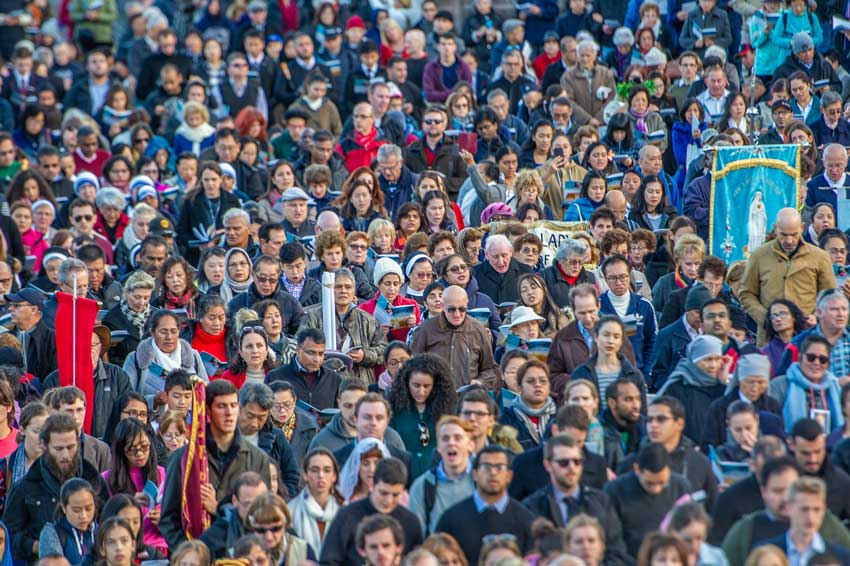
As parents, we acknowledge our belief in Jesus present at the centre of the Eucharistic procession by our commitment to be present there. Our children recognise and will remember this commitment that we make of our time and effort. Here it is so very important that parents share the reasons which underlie this commitment with their children.
It is no so much the duty to do so that will impress the hearts and minds of their children. It will be the love and affection which they express for their Beloved present in the monstrance which will be forever embedded in their memories.
We walk with Jesus because we love Jesus. This is the key message that needs strike our young people’s hearts!
For the same reason He chooses to walk with us through every moment of our lives.
5. We recognise that Jesus walks alongside us in humility
What a wonderful gift it is that Jesus comes to meet us! When we consider that Jesus Christ is God – the same God who keeps us in existence, who created the universe, and who knows us and loves us personally and intimately – we come to the huge realisation that it is Jesus who is gifting us with His presence and not the other way around. So often we think in terms of doing ‘God the favour’ by attending even if we don’t verbalise it in such a manner.
It is important to use the word ‘gift’ very, very often with our children and to imbue within them a deeper understanding of what this word means and implies. Everything that God gives us is ‘gift’. Our life, our family, our Faith!
God is Gift and as we are created in the image and likeness of God, so we are also called to be a gift to those around us. To attend and participate in a Eucharistic procession is to recognise the great gift that God has given us in being present among us and giving Himself to us so graciously and freely.
6. We walk in solidarity with Jesus
It is normal to consider what we would have done or done differently if we lived at the time of Jesus and had the opportunity to spend time in His very company. As great as this would have been, we often overlook the fact that we can choose to be in Jesus’ company every time we enter a Catholic church and kneel before the tabernacle.
The Eucharistic procession affords us this same opportunity. Here, Jesus is walking the streets of the city as he is carried in the hands of the priest. He looks out for His friends to accompany Him as He walks in the midst of so many who are indifferent to the love which He proffers. To present this walk as being in solidarity with Jesus our friend, is a beautiful thought to share with our children as they will see Jesus as a real Person and someone with whom they can converse and share their inner life with.
7. To be the hands and feet and face of Jesus to onlookers
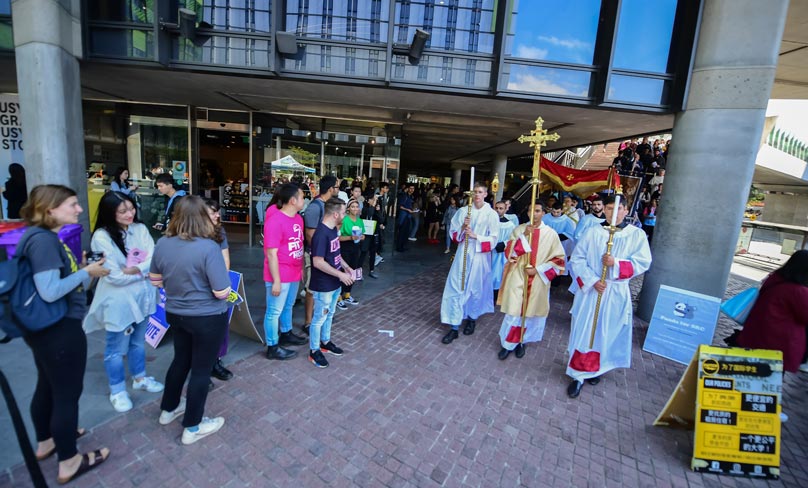
To see ‘Christ walking by’ is certainly not an everyday experience for the majority of people in this day and age. We could safely assume, that most would not even know that it is Jesus who is processing past them. They may recognise that this is some Christian religious event but not the actual reality of what is being presented before their very eyes. When we slow down and consider this fact, we have great reason to be sad that so many of our fellow citizens have as yet not had the life changing experience of encountering the Lord Jesus.
By being intentional and open to the Lord’s desire to meet everyone where they are at, a Eucharistic procession gives us and our children the opportunity to be the hands and feet and face of Jesus to those who gather and pay attention. Our smiles and the way that we interact with the onlookers, can often influence the perspective they take away of Catholics and what they do and represent. To do this effectively, we need to look at those who pass our way with the look of Christ and encourage our children to do the same.
8. To experience the inherent beauty of a Eucharistic procession
Bishop Robert Barron, one of the ‘go to’ experts in the area of evangelisation, exhorts Christians to “lead with beauty” when seeking to set up opportunities for an encounter with Christ. As parents, we should look to create these same opportunities for our children and a Eucharistic procession provides for this in spades.
What with the vibrant colours of the associated banners and vestments, the sight of the Archbishop and accompanying monstrance and baldacchino, the heavenly notes of the choristers, and the smell of incense emanating from the thurible, the encounter with transcendent beauty will be all-pervading.
We know that children notice everything and this encounter with God by way of beauty will enliven their minds and bring about a spontaneous burst of questions in response to the presented, and generally uncommon, stimuli. This reaction is often referred to as ‘spiritual curiosity’ and is one of the techniques by which to invite children, especially, into a deeper encounter with God through the naturally human trait of inquiry.
9. To see that living the Faith can be normative
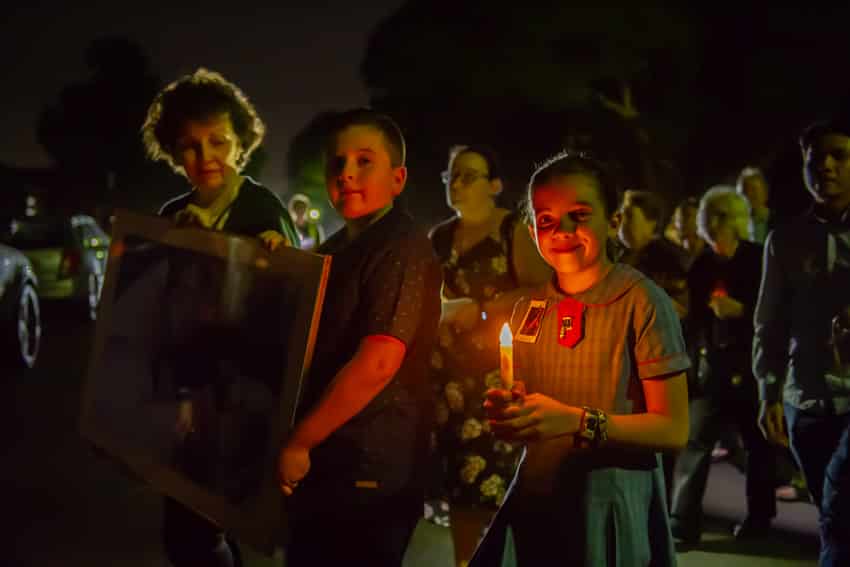
Parents often worry if there will be other children in attendance when bringing their own children to something which is ‘religion’ oriented. This is a normal concern as parents do in fact want their children to be happy and have a good experience when being brought to events of this type.
A Eucharistic procession which is held regularly and which is advertised widely, has the potential to bring in a large number of people and especially those who are committed to giving witness to their faith in public. This often includes other like-minded families who will, in the main, encourage their own children to attend for many of the reasons listed above. Thankfully, more and more events are being organised to which young people are being drawn. Parents need to make the most of these opportunities so that, as their children move into that critical phase of choosing what they will or won’t attend, they will have had enough good experiences to encourage them to participate of their own volition.
10. To walk with our Mother Mary as she presents her Son to the world
One of the most famous place of Christian pilgrimage is the Via Dolorosa in Jerusalem. Here, pilgrims walk the traditional route by which Our Lady followed her Son on his way to Calvary. At its heart, a Eucharistic procession brings Jesus into our midst and it has always been the belief of the Church that wherever Jesus is, the Mother is there with Him encouraging her children to “do whatever He tells you”.
This consoling truth should always be shared with children. Many are able to resonate with their Blessed Mother quite easily and parents do well to introduce this reality to them as they walk in procession so that they know in truth that Mary is there with them!
This understanding will help them to grasp more readily the belief in the Communion of Saints and that, in effect, they are walking with hundreds and thousands of persons and not just those in their immediate vicinity.
Yes, to be friends with Jesus means that we are part of a huge family. Eucharistic processions allow us to walk intimately with Christ and that with Him by our side, we are never alone!
Steven Buhagiar is the team leader of the Sydney archdiocese’s Life, Family and Outreach Office.
Related article:
